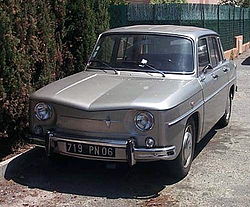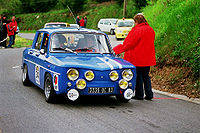| Revision as of 21:10, 6 December 2006 edit151.20.3.138 (talk)No edit summary← Previous edit | Revision as of 15:19, 28 December 2006 edit undo80.135.33.171 (talk)No edit summaryNext edit → | ||
| Line 47: | Line 47: | ||
| ] | ] | ||
| ] | ] | ||
| ] | ] | ||
| ] | ] | ||
Revision as of 15:19, 28 December 2006
Motor vehicle| Renault 8 | |
|---|---|
 | |
| Overview | |
| Manufacturer | Renault |
| Also called | Renault 10 |
| Production | 1962–1971 |
| Body and chassis | |
| Class | Small family car |
| Body style | 4-door sedan |
| Powertrain | |
| Engine | 956 cc I4 1108 cc I4 1255 cc I4 1289 cc I4 |
| Transmission | 3-speed manual 4-speed manual 5-speed manual |
| Dimensions | |
| Length | 4000 mm |
| Width | 1490 mm |
| Chronology | |
| Predecessor | Renault Dauphine |
| Successor | Renault 14 |

The Renault 8 (Renault R8 until 1964) and Renault 10 are two small family cars produced by the French automaker Renault in the 1960s and early 1970s. The 8 was launched in 1962, and the 10, a more upmarket version of the 8, was launched in 1965. Both ceased production and sales in France in 1971, although they were produced in Bulgaria until 1970 (see Bulgar Renault), and continued to be produced in Spain until 1976.

The 8 was released in July 1962 and was based on the outgoing Renault Dauphine. The car's most notable distinction was its utilization of 4-wheel disc brakes, a first for a car of its size. The 8 was powered by an all-new 956 cc engine developing 44 PS.
A more powerful model, the 8 Major, was released in 1964, featuring an 1108 cc engine developing 50 PS. A still more powerful version, the 8 Gordini, was also released that year, with a tuned engine of the same capacity but developing 90 PS and a five-speed manual transmission. The Gordini was originally available only in blue, with two white stripes. In 1965, the Renault 10 Major, a plusher version of the 8 with a different front and rear, was released, replacing the 8 Major. The 10 is significant as the first Renault model to be offered with a fully automatic transmission, which unlike all later automatic Renaults had a push button gear selector.

In 1967, the 8 Gordini received a facelift, adding two extra headlights, and its engine upgraded to a 1255 cc unit rated at 100 PS. Both the 8 and the 10 (already lost the word Major) were heavily revised for 1968, with some of the 10's features making it in to the 8, resulting into a reappeared 8 Major which replaced the basic model. The 10 itself was facelifted, with rectangular headlights added. The changes also saw the addition of the 8S, a sportier model with a 1108 cc engine rated at 60 PS. A larger unit, the 1289 cc engine from the new Renault 12, was added in 1970, giving birth to the R10 1300.
French production of the 8 and 10 ceased in 1971, with final sales as late as 1973. FASA-Renault, the company's Spanish arm, continued to produce models 8 and 8TS (quite analogue to the 8S) until 1976 for the Spanish and Mexican markets.
External links
- Réné's Renault Pages: Renault 8 and 10
- El Rincón del Renault 8
- Renault 10: Reconstrucción de un Clásico Desconocido
- Renault 10 en Colombia
| « previous — Renault car timeline, 1940s–1980s — next » | ||||||||||||||||||||||||||||||||||||||||||||||||||||||||||||||||||||||||||||||||||||||||||||||||||||||||||||||||||||||||||||||||||||||||||||||||||||||||||||||||||||||||||||||||||||||||||||||||||||||||||||||||||||||||||||||||||||||||||||||||||||||||||||||||||||||||||||||||||||||||||||||||||||||||||||||||||||||||||||||||||||||||||||||||||||||||||||||||||||||||||||||||||||||||||||||||||||||||||||||||||||||||||||||||||||||||||||||||||||||||||||||||||||||||||||||||||||||||||||||||||||||||||||||||||||||||||||||||||||||||||||||||||||||||||||||||||||||||||||||||||||||||||||||||||||||||||||||||||||||||||||||||||||||||||||||||||||||||||||||||||||||||||||||||||||||||||||||||||||||||||||||||||||||||||||||||||||||||||||||||||||||||||||||||||||||||||||||||||||||||||||||||||||||||||||||
|---|---|---|---|---|---|---|---|---|---|---|---|---|---|---|---|---|---|---|---|---|---|---|---|---|---|---|---|---|---|---|---|---|---|---|---|---|---|---|---|---|---|---|---|---|---|---|---|---|---|---|---|---|---|---|---|---|---|---|---|---|---|---|---|---|---|---|---|---|---|---|---|---|---|---|---|---|---|---|---|---|---|---|---|---|---|---|---|---|---|---|---|---|---|---|---|---|---|---|---|---|---|---|---|---|---|---|---|---|---|---|---|---|---|---|---|---|---|---|---|---|---|---|---|---|---|---|---|---|---|---|---|---|---|---|---|---|---|---|---|---|---|---|---|---|---|---|---|---|---|---|---|---|---|---|---|---|---|---|---|---|---|---|---|---|---|---|---|---|---|---|---|---|---|---|---|---|---|---|---|---|---|---|---|---|---|---|---|---|---|---|---|---|---|---|---|---|---|---|---|---|---|---|---|---|---|---|---|---|---|---|---|---|---|---|---|---|---|---|---|---|---|---|---|---|---|---|---|---|---|---|---|---|---|---|---|---|---|---|---|---|---|---|---|---|---|---|---|---|---|---|---|---|---|---|---|---|---|---|---|---|---|---|---|---|---|---|---|---|---|---|---|---|---|---|---|---|---|---|---|---|---|---|---|---|---|---|---|---|---|---|---|---|---|---|---|---|---|---|---|---|---|---|---|---|---|---|---|---|---|---|---|---|---|---|---|---|---|---|---|---|---|---|---|---|---|---|---|---|---|---|---|---|---|---|---|---|---|---|---|---|---|---|---|---|---|---|---|---|---|---|---|---|---|---|---|---|---|---|---|---|---|---|---|---|---|---|---|---|---|---|---|---|---|---|---|---|---|---|---|---|---|---|---|---|---|---|---|---|---|---|---|---|---|---|---|---|---|---|---|---|---|---|---|---|---|---|---|---|---|---|---|---|---|---|---|---|---|---|---|---|---|---|---|---|---|---|---|---|---|---|---|---|---|---|---|---|---|---|---|---|---|---|---|---|---|---|---|---|---|---|---|---|---|---|---|---|---|---|---|---|---|---|---|---|---|---|---|---|---|---|---|---|---|---|---|---|---|---|---|---|---|---|---|---|---|---|---|---|---|---|---|---|---|---|---|---|---|---|---|---|---|---|---|---|---|---|---|---|---|---|---|---|---|---|---|---|---|---|---|---|---|---|---|---|---|---|---|---|---|---|---|---|---|---|---|---|---|---|---|---|---|---|---|---|---|---|---|---|---|---|---|---|---|---|---|---|---|---|---|---|---|---|---|---|---|---|---|---|---|---|---|---|---|---|---|---|---|---|---|---|---|---|---|---|---|---|---|---|---|---|---|---|---|---|---|---|---|---|---|---|---|---|---|---|---|---|---|---|---|---|---|---|---|---|---|---|---|---|---|---|---|---|---|---|---|---|---|---|---|---|---|---|---|---|---|---|---|---|---|---|---|---|---|---|---|---|---|---|---|---|---|---|---|---|---|---|---|---|---|---|---|---|---|---|---|---|---|---|---|---|---|---|---|---|---|---|---|---|---|---|---|---|---|---|---|---|---|---|---|---|---|---|---|---|---|---|---|---|---|---|---|---|---|---|---|---|---|---|---|---|---|---|---|---|---|---|---|---|---|---|---|---|---|---|---|---|---|---|---|---|---|---|---|---|---|---|---|---|---|---|---|---|---|---|---|---|---|---|---|---|---|---|---|---|---|---|---|---|---|---|---|---|---|---|---|---|---|---|---|---|---|---|---|---|---|---|---|---|---|---|---|---|
| ||||||||||||||||||||||||||||||||||||||||||||||||||||||||||||||||||||||||||||||||||||||||||||||||||||||||||||||||||||||||||||||||||||||||||||||||||||||||||||||||||||||||||||||||||||||||||||||||||||||||||||||||||||||||||||||||||||||||||||||||||||||||||||||||||||||||||||||||||||||||||||||||||||||||||||||||||||||||||||||||||||||||||||||||||||||||||||||||||||||||||||||||||||||||||||||||||||||||||||||||||||||||||||||||||||||||||||||||||||||||||||||||||||||||||||||||||||||||||||||||||||||||||||||||||||||||||||||||||||||||||||||||||||||||||||||||||||||||||||||||||||||||||||||||||||||||||||||||||||||||||||||||||||||||||||||||||||||||||||||||||||||||||||||||||||||||||||||||||||||||||||||||||||||||||||||||||||||||||||||||||||||||||||||||||||||||||||||||||||||||||||||||||||||||||||||